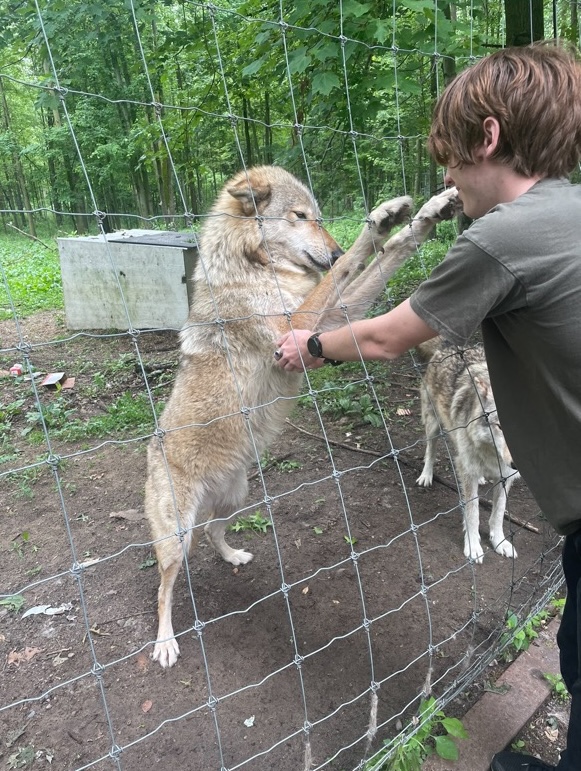Modifying animal behavior through positive reinforcement
Related Programs
Related Posts
Connect With Us
September 17, 2024
“It can get a bit messy as they aren’t so concerned about being neat, but it is truly amazing to see them engage with painting,” said psychology major Dallas Wilson, reflecting on a highlight of his summer. “Sometimes they’ll make handprints or they’ll actually do some tracing with their fingers.”
He may sound like a proud camp counselor, but Wilson isn’t talking about children, or even humans. Wilson spent the summer at The Animal Behavior Center (ABC) in Lambertville, where, among other things, he helped three ring-tailed lemurs learn to paint.
“These animals are intelligent and cognitively advanced so they need to receive mental stimulation,” Wilson said of the activity. “It is also important for any species of animal under human care to know that they are safe and can trust their caretakers.”
Before his internship, Wilson did a study on animal cognition with professor Tammy Jechura, who in turn introduced Wilson to ABC founder Lara Joseph. ABC teaches and supports veterinarians, zookeepers, and individual pet owners learning positive methods for modifying animal behaviors. ABC also works with animals themselves, often focused on those who’ve experienced neglect or abuse, or just haven’t been handled with regard to individual and species-appropriate training methods.

Albion College psychology major Dallas Wilson recently completed an internship at The Animal Behavior Center in Lambertville.
Broadening one’s view of psychology
“Just as with people, animals are extremely psychologically complicated and their behavior can’t be simply categorized by species,” said Wilson, who also spent considerable time with ABC’s pack of four timber wolves. “Two of our wolves for example are like night and day. One is generally calm, a little shy, and likes to just hang around me. The other one is extremely hyper and always excited to greet me.”
The wolves’ individual personalities also serve as a reminder: Regardless of their rapport, Wilson treats them with a high degree of respect. “A more wild species cannot be treated the same as a domesticated one. There must be a level of caution maintained as they are not naturally ‘submissive’ to humans,” Wilson said.
Wilson also learned how “positive reinforcement” isn’t simply about teaching behaviors; it also provides physical and mental enrichment while decreasing the anxiety produced by environmental changes. “This summer, we moved a pair of black casqued hornbills out of The ABC into a zoo enclosure,” Wilson explained. “Because we don’t utilize trickery, we trained the birds to fly into a transport cage on their own and allowed them to adjust to being inside the smaller environment. This helped allow them to be transported much more comfortably and with minimal anxiety.”
“This experience has helped broaden my view of psychology. My courses at Albion did not specifically emphasize animal psychology, yet I’ve still been able to apply my knowledge to this job in ways I would never have considered,” Wilson said. “In a vaster perspective, this has shown me just how complicated and yet interlinked, psychology truly is. We are all individual beings mentally, but we are also related, even across different species.”
Dallas Wilson is majoring in psychology and anthropology/sociology, and is a member of Albion’s cross country team. He is the child of Gordie and Pamela Wilson of Trenton and is a graduate of Trenton High School.
